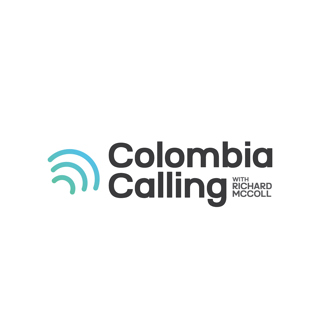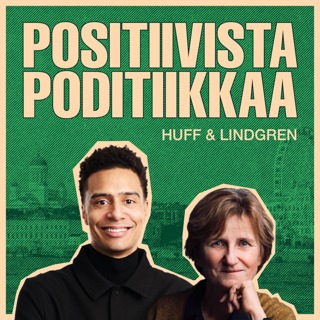
532: Journalism At War In Colombia
Hallo and welcome to another episode of Colombia Calling - I’m Emily Hart and this week I’ll be chatting to Nubia Rojas about journalism at war – how journalists fell victim to, but also took part in, Colombia’s civil conflict. Nubia is a journalist and researcher who has worked on conflicts across the world both as a correspondent and an analyst, working for the United Nations, Doctors without Borders, and Oxfam, as well as numerous Colombian outlets. Most recently, Nubia authored a chapter of the final report of Colombia’s Truth Commission – a historic publication which was the outcome of an unprecedented investigation into the causes and consequences of Colombia's internal armed conflict – the final report was the result of nearly four years’ work and tens of thousands of interviews. Today we’ll be chatting about Nubia’s chapter – digging in to the historical and present relationship between journalism and Colombia’s political elites, paramilitary PR, rebel elites, corporate takeovers and more. Please sign up for my substack: https://substack.com/@ehart and support the podcast: https://www.patreon.com/colombiacalling
20 Elo 20241h

531: Can President Petro Turn Things Around in Colombia
"From Ambition to Stagnation: the road ahead for Petro's administration," is the title of a new report by Eitan Casaverde and Sergio Guzman of Colombia Risk Analysis and this is what we are discussing this week on the podcast. There are questions that abound: Is the Colombian system structured for radical change? What have been the success stories of the Petro presidency so far? What is this strategic ambiguity towards the situation in Venezuela? Who will be Petro's successor? How is the list of potential candidates for the elections in 2026 shaping up? And, hear the Colombia Briefing by Emily Hart and subscribe to her Substack: https://harte.substack.com Support us: https://www.patreon.com/colombiacalling
13 Elo 20241h 7min

530: The Latin American Review of Books
The Latin American Review of Books – LatAmRoB – has been publishing online continuously since 2005 as a small, independent website based in the UK that reviews books and films. And we are very fortunate to have founder Gavin O'Toole here on the Colombia Calling podcast this week. The Latin American Review of Books is commercially and politically independent and value, above all sharp writing and commentary that brings to a wider audience knowledge, understanding and insight about all things Latin American. So, this week we chat about literary offerings from the region, goings on in Venezuela and Colombia, Boris Johnson's bizarre trip to Venezuela and much much more. Check out the website: https://www.latamrob.com Support the Colombia Briefing and Emily Hart on Substack: https://substack.com/@ehart and support us: www.patreon.com/colombiacalling
6 Elo 202458min

529: The Sculptor People : the ancient mystery and modern theft of the statues of San Agustín
I’m Emily Hart and today, I’ll be speaking to two experts and campaigners on Colombia’s San Agustín Statues – getting into what they might mean and why they matter, as well as how so many of them ended up not in Colombia, and how important it is to get them back here. In San Agustín, Huila, hundreds of ancient megalithic statues have been found, the region’s largest collection of pre-Hispanic sculptures, dating back to the 9th century BC. Some are human-ish figures, but with fangs and wings, others are simian, some combination of animal and man - some are carved in situ, others onto single rock slabs 15 feet tall – the statues both invite and totally defy interpretation and theories about them abound, from burial rights, shamans, and psychedelic drugs to aliens. These statues were made by the Sculptor People, the Pueblo Escultor, an enigmatic community we are still trying to decipher. Surprisingly little is known about the people who created the mounds in which most of the statues were found – what they represent is much-debated, as is their purpose – the community also disappeared, moved away, or simply stopped sculpting well before the Spanish arrived – there are competing explanations as to why. Though there are hundreds of statues at archaeological sites around San Agustín, there are statues missing – in the 20th Century, European institutions and individuals removed statues from sites – many ended up in museums in cities like London and Berlin, others in private collections. But the movement to get this cultural patrimony back is gaining momentum – the current president has taken up the fight and hundreds of artefacts have been returned to Colombia over the last two years. It’s a conversation which has been growing across the world – and the clamour from Colombia is being heard. The Colombian government has now officially requested the return of a number of these statues held in Germany, a big step for the campaign group to achieve the return the statues to their place of origin. There is, of course, also a San Agustin statue in the possession of the British Museum, which has not responded to attempts at communication. So, today on the show I have David Dellenback and Martha Gil, who are key to this campaign and will be telling us about the academic and ethical issues around repatriation, as well as digging into the history and lore of the statues themselves. David is originally from the US but has lived in San Agustín since the 1970s, author of the book ‘The Statues of the Pueblo Escultor’, along with the most complete set of diagrams and studies of the statuary, their measurements, locations, and features. Martha Gil is a guide and cultural activist, as well as translator of David’s book into Spanish. The two, who are married, have presented the study, as well as an illustrated campaign book about the repatriation of these spiritual and cultural artefacts at Bogota’s international bookfair, the FilBo. We are going to be talking about the ancient mysteries of the Pueblo Escultor and their megalithic language – as well as about the modern history of plunder and theft – and whether these perplexing statues might one day soon, be coming home.
30 Heinä 20241h 29min

528: Petro, the Documentary
“Petro.” Watch the documentary by Sean Mattison and Trevor Martin following Gustavo Petro during his run for the presidency of Colombia in 2022. "Petro" begins in September 2021 at the launch event of Gustavo Petro's campaign. The documentary makers enjoy unprecedented access to Colombia's most charismatic and polarizing politician, the film follows the highs and lows of the Colombian progressive movement and Petro's historic campaign for president through Election Day. On the Colombia Calling podcast this week, we speak to Sean Mattison about the documentary, how it came to be, what Petro is like behind the scenes and with his family, why the president is so polarizing and accusations of propaganda. Check out: https://seanmattison.com
23 Heinä 202457min

527: Blood, Gun, Money - an investigation into the enormous black market for firearms
From the author of El Narco, Ioan Grillo presents us with a searing investigation into the enormous black market for firearms, essential to cartels and gangs in the drug trade and contributing to the epidemic of mass shootings. The gun control debate is revived with every mass shooting. But far more people die from gun deaths on the street corners of inner city America and across the border as Mexico’s powerful cartels battle to control the drug trade. Guns and drugs aren’t often connected in our heated discussions of gun control-but they should be. In Ioan Grillo’s groundbreaking new work of investigative journalism, he shows us this connection by following the market for guns in the Americas and how it has made the continent the most murderous on earth. On the Colombia Calling podcast, we discuss the arms trade, the drugs trade, the so-called war on drugs and how this all affects Colombia. Grillo is one of the foremost experts on these topics as he is based in Mexico and appears in the world's press reporting on said issues. Check out his website: https://www.ioangrillo.com The Colombia Briefing is reported by Emily Hart. Sign up for her Substack: https://substack.com/@ehart
16 Heinä 202458min

526: Ancestral Coffee Cultivation and Nasa Heritage by Native Root in Cauca, Colombia
On the Colombia Calling podcast this week, we welcome back both Ervin Liz and Simon Winograd and discuss Native Root, their coffee-growing company based in rural Colombia. Check out the page: www.nativerootcoffee.com Colombia, the land of coffee...but which coffee should you choose? My advice - completely uncalled for and unwarranted - is to do a little bit of research and source a coffee where the money returns to the growers, with no middle-men and enables social change. This is where Native Root comes in. I have had the pleasure of hosting both Ervin Liz and Simon Winograd of Native Root on the Colombia Calling podcast on various previous occasions. What I love about Native Root is that it is a family-run outfit, based in Tierradentro, Cauca and between 12 and 30 per cent of all proceeds return to the community. This is an important detail, as Cauca is one of the most complex and conflicted departments in Colombia at the moment. There are warring criminal groups, splinter guerrilla groups, dissident groups and others, all vying for control of this strategic region for the transhipment and production of illicit drugs, people trafficking, arms trafficking, extortion and more. Who suffers, the regular people on the ground, the indigenous communities, the farmers, the smallholders and people just trying to make ends meet. We discuss this and more as we enjoy an engaging conversation about the world of coffee, the coffee market and Colombian politics and conflict. Check out: NATIVE ROOT Online purchases can be made WITHIN COLOMBIA directly on their website, for orders overseas, contact them via Email or WhatsApp as they ship everywhere. The Colombia Briefing is reported by Emily Hart. https://substack.com/@ehart
9 Heinä 20241h 1min

525: Pablo Escobar's Influence on Colombian Football in the 1990's
On the Colombia Calling podcast this week we discuss Pablo Escobar's influence on Colombian football in the early 1990's with David Arrowamith, author of a new book: "Narcoball: Love, Death and Football in Escobar's Colombia." In a far-reaching conversation David and I discuss Pablo Escobar, his role in politics, the reality of Colombia in the 1990's, Colombian football in general and much more. If you like the true crime genre and have a smattering of interest in football, then this one's for you! Buy the book: https://a.co/d/0hZPJRF0 Support the podcast: www.patreon.com/colombiacalling Sign up to Emily Hart's Substack: https://substack.com/@ehart
2 Heinä 20241h 1min


















